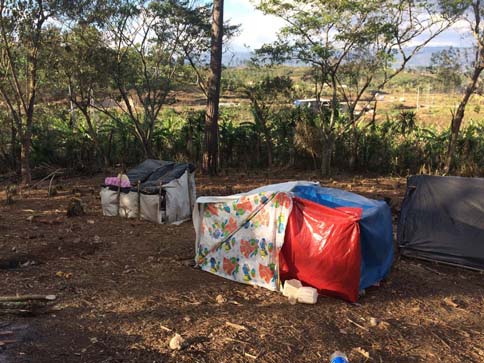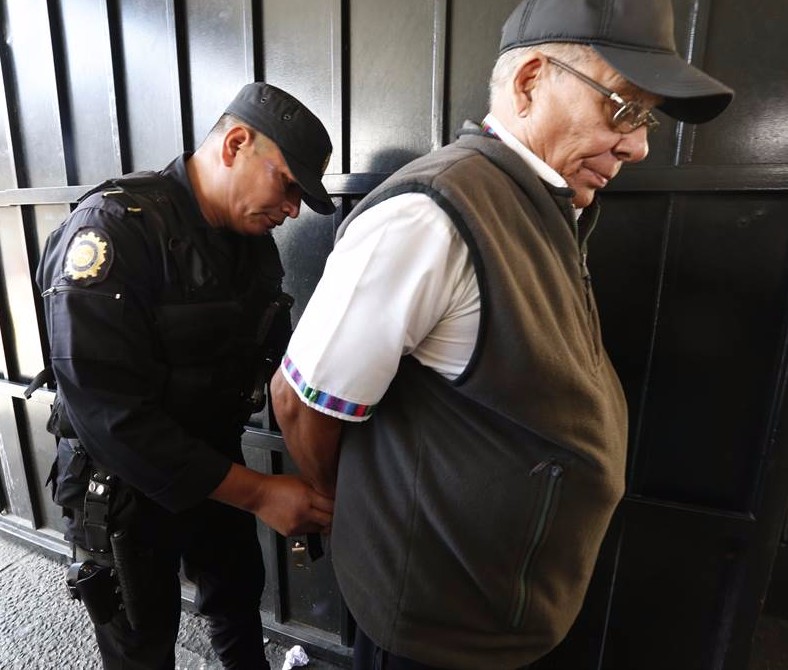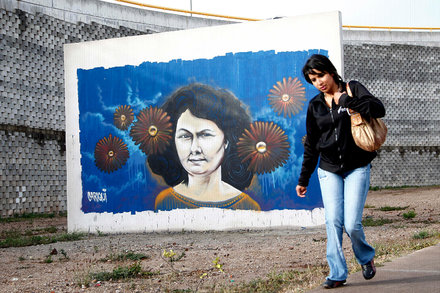
Tres miembros del personal y la junta de directores de CRLN viajaron a Honduras del 28 febrero al 8 marzo junto con La Voz de los de Abajo, uno de los grupos asociados de CRLN. A continuación se presenta una reflexión de Sharon Hunter-Smith sobre la visita de dos comunidades dedicadas a la recuperación de tierras como parte del Centro Nacional de Trabajadores Rurales.
Tegucigalpa y La Paz, Honduras; 6 de Marzo del 2017
Nuestro grupo de Chicago se quedó mirando la tosca mesa de madera, en la cual habían dos docenas o más de latas de gas lacrimógeno, además de un par de proyectiles de bala, recogidos por la comunidad del 9 de julio en la zona que rodeaba el lugar donde estábamos. El más grande, diseñado para ser disparado desde un fusil, fue estampado “Hecho en EEUU”. La conexión entre el ejército estadounidense y la ayuda policial a Honduras y la violenta persecución de campesinos empobrecidos hondureños fue clara en los objetos que teníamos ante nosotros.
La comunidad rural original de 28 familias ha sido desgastada por gases lacrimógenos y desalojada de sus sencillas viviendas construidas a mano y tierras cultivadas, 26 veces por el ejército o la policía hondureña. En el último desalojo sorpresivo del 13 de enero de 2017, la policía siguió a los fugitivos, incluso mujeres y niños, a través del valle, disparando hasta el final. Un hombre recibió un disparo en la pierna y una mujer embarazada sufrió un aborto después de salir corriendo, presa del pánico, de las fuerzas de “seguridad”. También derribaron y quemaron casas, robaron o quemaron posesiones y herramientas dejadas en y alrededor de las casas, y cortaron algunos de los árboles frutales y cosechas. Desde entonces, las mujeres y los niños, se han trasladado a una comunidad cercana mientras que los hombres han re-ocupado la tierra.
Esta comunidad, la cual no tenía tierra antes, organizada por el Centro Nacional de Trabajadores del Campo (CNTC), se instaló esta tierra abandonada y desértica en el 2010. Ellos cavaron trincheras y compraron tubos de plástico para llevar agua para riego y agua potable de una fuente a 3 kilómetros de distancia. Plantaron árboles frutales y otros cultivos para alimentar a sus familias. Una ladera seca se volvió verde y proporcionó una manera de ganarse la vida. La CNTC trabaja con otras 203 comunidades, como la 9 de julio, que reclaman tierras y la aprovechan en 14 de los 18 departamentos hondureños (lo que en los Estados Unidos se llamaría estados).
La Ley Nacional de Reforma Agraria dispone que las tierras desocupadas aptas para la agricultura pueden ser expropiadas y otorgadas a personas indigentes y sin tierra por el gobierno, pero esto no ocurre con frecuencia. Para forzar el tema y obtener la tierra esencial para que la gente rural se mantenga a sí misma y a sus familias, la CNTC trabaja con gente sin tierra para asentarse y plantar en tierras no utilizadas, subdesarrolladas o abandonadas. Los ocupantes se declaran a favor del terreno bajo la Ley de Reforma Agraria con el Instituto Nacional Agrario de Honduras (INA).
La comunidad del 9 de julio es la más perseguida de todas las comunidades de la CNTC, pero otras generalmente son desalojadas por lo menos varias veces en su lucha por obtener tierras. ¿Cuánto tiempo tienen que estar en la tierra antes de que se les conceda un título? “No sabemos con esta administración. No están de nuestro lado “, respondió un hombre. Algunas de las comunidades CNTC han vivido y trabajado en sus tierras durante 15-20 años y aún no tienen título.
El director del CNTC, Franklin Almendares, explicó que el 64% de la población hondureña es rural, empobrecida y desplazada o que se encuentra desplazada de sus tierras por falta de un título. El 46% vive en extrema pobreza. “No somos pobres, nuestra tierra es rica, pero estamos empobrecidos, porque nos echan de la tierra donde vivimos y cultivamos. Al mismo tiempo, señaló Almendares, cuando los grandes terratenientes corporativos toman tierra sin tener título, el gobierno es cómplice de sus acciones y les concede títulos.
Visitando un segundo proyecto de recuperación de tierras, los organizadores de la CNTC nos llevaron a un terreno en una plantación que había sido abandonada por décadas, su dueño viviendo en Tegucigalpa. 14 jóvenes y niños, la mayoría en la adolescencia y principios de los veinte, habían llegado 11 días antes por la noche. Habían hecho tiendas a partir de piezas de plástico y lona sostenidas por palos para refugiarse, y habían comenzado a limpiar los árboles para que pudieran comenzar a crear campos para plantar. Los más jóvenes de ellos parecían tener alrededor de 11 años. Parecían cautelosos y tímidos, vulnerables y asustados. La mayoría no nos habló, dejando que los organizadores de la CNTC nos explicaran su situación.
Todos querían adquirir un terreno para trabajar y tener algo que desear. Eventualmente, querían formar una familia y necesitaban una forma de apoyarlos. Sin tierra, no tenían esperanza, y sin esperanza, no tenían razón para vivir.
Los organizadores de la CNTC utilizaron nuestra visita como una capacitación para estos jóvenes- cómo recibir un grupo internacional, cómo presentarse. Habían entrenado al líder del grupo para presentarse con una breve descripción de sus objetivos en la ocupación de esta tierra. Nos dijo que después de llegar, no durmieron tres noches, preocupados porque la policía los encontraría y los desalojaría. También no habían dormido afuera antes con insectos y serpientes en la zona, y se estaban acostumbrando a eso. Con palabras alentadoras, los organizadores de la CNTC dijeron al grupo que el desalojo es sólo una desgracia pasajera en el camino hacia la adquisición de tierras, hogares y comunidad. Cada grupo había experimentado esto, y muchos habían ganado sus títulos. Deben trabajar y tener esperanza de que ellos también tengan éxito un día, porque este camino es el único que les ofrece alguna esperanza.
¿Qué podemos hacer nosotros los de Estados Unidos para detener la persecución de las comunidades que trabajan con la CNTC? Llame a la oficina de su Representante del Congreso, pida hablar con el personal responsable de la política exterior o deje un mensaje y solicite que co-patrocinen la Res. H. 2199, Ley de Derechos Humanos en Honduras de Berta Cáceres. Esto suspendería toda la ayuda de seguridad de los Estados Unidos a Honduras, incluyendo equipo y entrenamiento, hasta que cesen sus violaciones de derechos humanos. Debemos detener la financiación estadounidense que permita a Honduras usar la violencia contra su propio pueblo, personas que sólo quieren una oportunidad para apoyar a sus familias y contribuir a la vida de sus comunidades.






